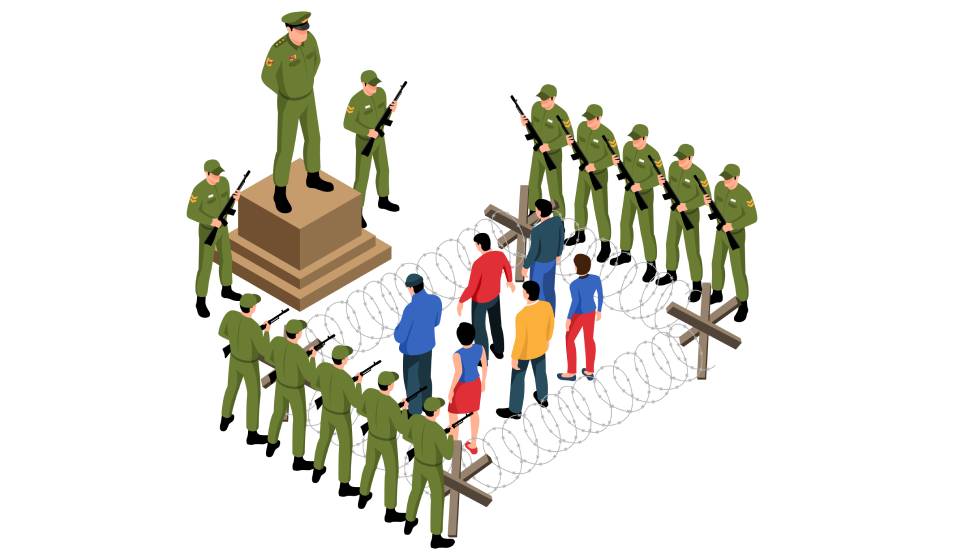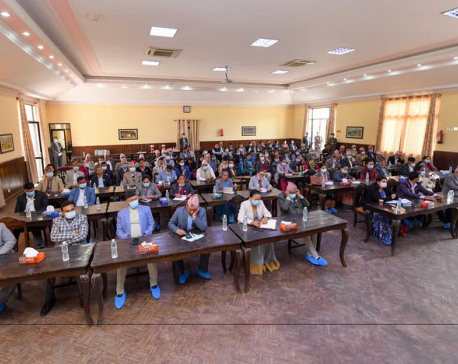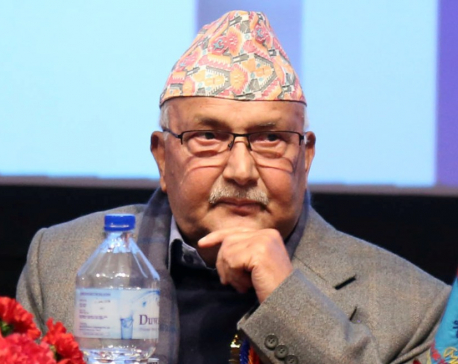
OR
Opinion


Kanchan Jha
The author is a political leader of the Nepali Congress party and Emmy-nominated former journalistnews@myrepublica.com
Assessing the conduct, investigations, technology, and human rights defense of Nepal Police
In a modern democratic state, the police are meant to enforce the laws that preserve its core democratic values, such as the right to protection and security. However, the actions of the police force in Nepal, in recent times, have been called into question as they have been accused of violating the very principles they are tasked with. From time to time, Nepal Police has faced severe criticism and calls for reform, due to allegations of extrajudicial killings, substandard handling of criminal cases, and human rights violations. The police organization has been shadowed with uncertainty and conflict, and finding a way forward has been a continuous challenge. A report by Human Rights Watch in 2023 states that police and military abuses, including extrajudicial killings and torture-related custodial deaths are still prevalent and often go unchallenged in Nepal.
Originally created as a defense force through the transformation of Mukti Sena (Liberation Army) during the Nepali Congress-led uprising in 1950-51, the Nepal Police is seen as a symbol of democracy. Unfortunately, it has failed to undertake necessary reforms and has instead embraced autocratic practices. This shift can be attributed to political interference, leadership disunity, group interests, and the domination of self-serving factions, resulting in a departure from the intended chain of command.
Nepal Police's credibility has been significantly undermined due to frequent reports of human rights violations and police misconduct. In the Terai-Madhesh region, the police have increasingly resorted to excessive and lethal force, which has been a persistent issue for many years, resulting in numerous extrajudicial killings. These killings occurred during the Madhesh movement, operations against underground groups and criminals, and street demonstrations, with at least 16 deaths from bullet wounds reported in the past five years and over 300 individuals killed after the Comprehensive Peace Accord in 2006. An independent investigation by the Asian Human Rights Association into the 2015 Madhesh movement revealed that 41 percent of police shootings were deliberate, causing fatalities in markets, hospitals, and residential areas. The investigation also found that 89 percent of security personnel acted negligently and used force, while only five percent followed regulations. Despite the opportunities to address these incidents, the police's continued use of excessive force has been seen as a betrayal of human rights principles, further aggravating the situation.
Transformation of Nepal Police
As a defense force that played a role in the country's quest for democracy, the structure of Nepal Police is based on the rudimentary structure of the army and has undergone numerous changes since its establishment, starting from the Rana era to the present-day republic. The goal of the police is to put democratic principles and practices into effect, but a lack of attention to restructuring has led to the persistence of the outdated “Panchayat system” working within the organization.
Nepal Police continues to rely on outdated methods, such as physical torture, during interrogations instead of utilizing technology in criminal investigations. Many victims of police torture choose to stay silent, but some file complaints with human rights organizations. This illegal and traditional approach to obtaining confessions through torture is still widespread and has been reported by research as affecting more than 35 percent of prisoners and detainees in the Terai-Madhesh region alone. The police have limited access to technology but have shown little interest in utilizing available resources like forensic kits, polygraph tests, and technical analysis. Nepal Police is also facing a shortage of specialized personnel for criminal investigations, which is hindering their ability to improve in this area.
Investments from international donors and diplomatic missions in Nepal have aimed to improve the police force's criminal investigation capabilities. For example, US agencies have provided training opportunities through organizations like the FBI, but these opportunities are not given to the most relevant officers. International organizations like the UK's DFID, Germany's GIZ, UNDP, and UNICEF have invested in Nepal Police by funding infrastructure and supporting police programs with a focus on human rights. Despite attending training on topics such as human rights, violence against women and children, and criminal investigations, the police have not demonstrated any improvement in their practices.
Political interference
The topic of political interference is frequently brought up in discussions about improving Nepal Police. The police community often cites political interference as the cause of their problems, both at the headquarters and the local level. The relationship between politics and Nepal Police needs to be critically evaluated to determine if politics has infiltrated the police force or if the police have allowed themselves to be influenced by politics. Political influence is most notable in internal matters such as transfers, promotions, and career progression of police personnel, leading to a single individual's ambition impacting these decisions and putting the entire force at risk. A systematic and scientific approach to personnel transfers, promotions, and career development is necessary to address this issue, but despite three decades since 1990, Nepal Police has not taken any official measures to address this issue. Instead, the police attribute it to political interference and informally express that it impedes their work.
Nepal Police have been influenced by politics and used for political gain, which undermines its independence and integrity. To maintain its credibility and trust, the police force must remain neutral and impartial, particularly in regard to suppressing dissent, personnel transfers, and promotions. Moreover, the issue is worsened when the police leadership itself seeks political protection for its own interests.
Way forward
The leadership of Nepal Police includes individuals who have worked at the United Nations and likely received training from the US federal police and the NYPD. The NYPD's data-driven approach to tackling crime, through the Comparison Statistics and Planning campaign, resulted in significant reductions in crime in New York. Adopting this approach in Nepal could bring similar results.
Nepal Police, as per the Constitution, is preparing for a transition in the federal system where it will have a presence and active role at both federal and provincial levels. Although being viewed as a capable security agency, the public has voiced dissatisfaction with its performance. Despite having seasoned leaders with a strong understanding of building a democratic force, Nepal Police has fallen short of public expectations, leading to criticism.
As the protector of democracy, the police must uphold its duty to enforce the rule of law and protect the rights of citizens. It is imperative for the home ministry and police leadership to rise above these issues and work toward restoring public trust in the organization.
You May Like This

Whither the Post-Election Nepali politics?
A well-organized party is essential to orient and manage the cadres. All this requires resources. Why couldn’t old parties/leaders deliver?... Read More...

CPN-UML PP meeting forms parliamentary board and statute amendment task force
The board also comprises dissident senior leaders Nepal and Khanal ... Read More...

RJP(N) could be the first party to withdraw its support to the govt
KATHMANDU, Dec 4: The Rastriya Janata Party-Nepal could be the first party to withdraw its support to the government. The... Read More...



Just In
- World Malaria Day: Foreign returnees more susceptible to the vector-borne disease
- MoEST seeks EC’s help in identifying teachers linked to political parties
- 70 community and national forests affected by fire in Parbat till Wednesday
- NEPSE loses 3.24 points, while daily turnover inclines to Rs 2.36 billion
- Pak Embassy awards scholarships to 180 Nepali students
- President Paudel approves mobilization of army personnel for by-elections security
- Bhajang and Ilam by-elections: 69 polling stations classified as ‘highly sensitive’
- Karnali CM Kandel secures vote of confidence















Leave A Comment